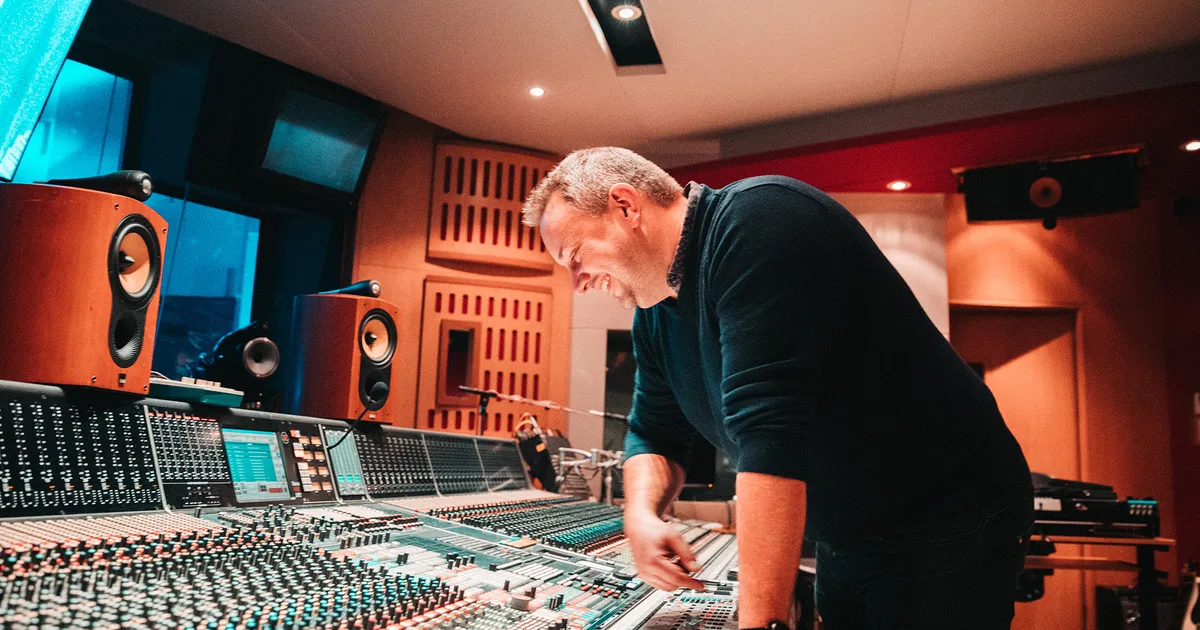
Studio One’s recent renovations have added major technical innovations in the control room. A 20-year old 72-channel Neve recording console has been replaced with an 84-channel upgrade. With each of the players or instruments miked individually, engineers are granted even greater flexibility during the final mixing process. Having access to stems of each instrument gives the creative team flexibility to edit different cuts of score much more easily if a scene is trimmed or extended in the final cut.
“The more stuff we do separately now – recording strings separately from brass, percussion – that helps in the editing process, because you can make edits work,” Dudman explains. “You can steal stuff from other cues to make the edit work.”
Studio One is capable of holding a 100-piece orchestra or choir at any one time, and the increase in recording channels available now means that, more often than not, each player is individually miked.
“One of the nice things about the studio is that you can do things separately, put them back together and no one would know,” enthuses Barton. “That’s often such a critical factor in what we do. In the dub, if the brass is interfering with the dialogue for some reason and you can’t understand a line because there’s some French horn thing over it, rather than pull down the whole music fader and get rid of it all, you can just take out the offending piece, as it were, or duck it down.”
“There are times where you know in advance that stuff’s going to change,” Dudman adds. “The composer has written to one version of the picture. They’re already four versions down, but there’s no time to re-score it.” As a result, whole sections of music may be recorded to include what’s known as an artificial stop halfway through a musical cue, followed by an artificial start . “That gives you a clean out and clean in,” he continues. “Then you might just do a patch section that will work for the later cut and the music editor will join them all together. That’s a much more time efficient way of doing things.”
While Studio One’s control room has seen significant changes, very little has been altered in the live room itself. In order to preserve its signature 2.3 second reverb and rich sound favoured by composers and directors alike, the 4,844 ft room has seen its Art Deco walls remain largely untouched, save for being washed. Unwilling to risk impacting the acoustics, its floor has been sanded and re-oiled as varnishing it would have altered the sound too much.
“I’ve always thought of the acoustics and science of recording as sort of part science, part voodoo,” Barton adds. “What we didn’t want them to change was the voodoo, which is working very nicely.”
As well as retaining the sonic qualities that have made the space so desirable, Abbey Road also acts as a technological time capsule of sorts. Modern mixing desks and equipment are optimised to utilise old microphones and equipment, some of which are as old as the building itself.
“We never throw anything away,” Dudman states. “The Neumann U87s, we’ve got maybe 30 of those and they’re all from the 80s… Then you’ve got all the classic valve microphones, which are 70 years old – the U47s that were used on Beatles vocals. We now use those on brass and solo vocals. The rest of the chain has improved so much that when those were first invented, you didn’t hear how good they were… We’ve also got the old mixing consoles, so depending on what kind of vibe you’re after, you can move the desk into Studio One and stick 16 mics through it if you want. Nothing’s fixed in that respect.”
The use of older recording equipment can sometimes be necessitated by the time period in which a particular project is set, as was the case during Barton’s work on an episode of the 12 Monkeys television series set in 1944 that required source music that sounded “authentically old”. The priority first and foremost, however, is always quality above all else.
“Ultimately, we’re always just trying to make stuff sound good,” Barton concedes. “It’s not necessarily about sounding realistic. It’s often hyperreal. Some of the old microphones have this really interesting thing where their high frequencies aren’t as pronounced. We often use words that don’t really mean very much, but they mean something to most engineers. We often say audio sounds ‘warm’ – because of the way that the early tech was designed, it tends to have those pleasing things that are part of the sound of what we like.”
There is, of course, an undeniably mythic quality to the hallowed studio spaces that remains perhaps Abbey Road’s biggest draw – even to those who might not be aware of it.
“That’s one of the things people say, they walk in and it does do something,” Barton enthuses. “Yes, it’s the old equipment and the combination of the cutting edge as well, but the walls do a thing. There’s a thing there, and you can’t quite put your finger on it. We had a fascinating session a few years ago with a children’s choir in Studio One… The moment they started singing, their director was like, ‘I haven’t heard them sing this well’. I think it just has that effect. You walk in and you have to bring your a‑game. People just do so instinctively.”


